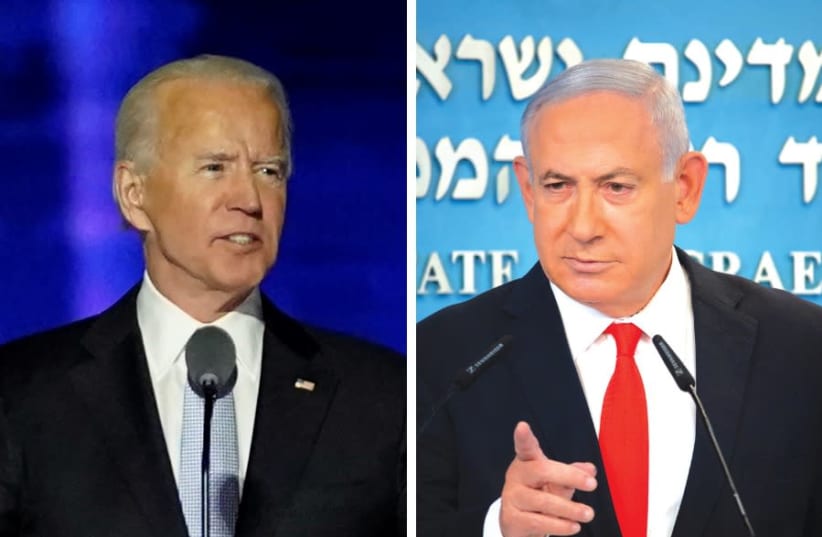Every day that passed with US President Joe Biden not calling Prime Minister Benjamin Netanyahu came with speculation about the region, and this intensified over time.
Now that the bets on when the call would come are closed – after Biden called on Wednesday evening – the time has come for Talmudic parsing of the readouts of the conversation.
The statements from the White House and the Prime Minister’s Office are similar in many ways, but the differences are telling.
Both mentioned strengthening the steadfast US-Israel relationship, and said the leaders discussed Iran and other regional issues. They both said they would work to expand the Abraham Accords to include more countries, but did not use that Trump-era name.
But there is a key difference at the beginning of the statement: “The conversation was very warm and friendly and lasted for approximately one hour,” the Prime Minister’s Office statement read. The White House readout said nothing about the atmosphere or the duration of the call.
“The two leaders noted their longstanding personal connection, and said that they would work together to continue strengthening the steadfast alliance between Israel and the US,” the PMO readout continued.
But the White House said that Biden “affirmed his personal history of steadfast commitment to Israel’s security, and conveyed his intent to strengthen all aspects of the US-Israel partnership, including our strong defense cooperation.”
Netanyahu sought to emphasize that he and Biden go back 40 years. Biden did the opposite: the White House statement focused on Biden’s history with Israel, as opposed to the individual leading it.
The prime minister constantly emphasizes his experience and his stature on the world stage, even more so during an election season. He and Biden really have known each other for around 40 years – since Netanyahu was deputy chief of mission at the Israel Embassy in Washington and Biden was a senator – and the prime minister emphasizes that point whenever asked about the US-Israel relationship under the new administration. Netanyahu is trying to broadcast that he is uniquely qualified to handle that relationship, as opposed to his rivals.
He also tried to portray a business-as-usual situation, even as more and more media outlets asked him why Biden hadn’t called yet. Of course, Biden had not called any other leader in the Middle East but Israel is used to getting special attention, and to many, the delay seemed suspicious. Netanyahu used his decades-long relationship with Biden to say that he’s not worried.
The less personal message from Biden apparently reflects a desire to not be seen as supporting Netanyahu 33 days before the Knesset election, as well as a broader move by the Biden administration to return to the more usual channels or communication and diplomacy in the US, as opposed to former president Donald Trump’s very informal style.
The Biden administration is also thought to be peeved at Netanyahu for what is seen as open partisanship in favor of the Republicans, and open cheerleading for Trump, even after Biden won the election.
Netanyahu said earlier this week that he doesn’t care if a president is Republican or Democrat – he only thinks about policies. But old habits die hard, and he continued acting like a Republican. The morning after his call with Biden, Netanyahu tweeted his condolences to the family of controversial right-wing radio host Rush Limbaugh, whom he said “was a great friend of Israel and... stood by us through thick and thin... We shall miss him dearly.”
Another notable difference between the readouts is that the White House said Biden “underscored the importance of working to advance peace throughout the region, including between Israelis and Palestinians.” The Prime Minister’s Office did not mention the Palestinians at all.
At the same time, Biden’s name-check of the Palestinians seems like an afterthought. It came almost at the end of the statement, and did not qualify for its own sentence. That is a far cry from former president Barack Obama, who called Palestinian Authority President Mahmoud Abbas before then-prime minister Ehud Olmert, emphasizing his focus on the peace process.
At the end of the day, the conversation was routine, a courtesy call. The tension that preceded it could easily become yesterday’s news and generally forgotten, if the leaders want it so. What matters is how the administration communicates on actual matters of policy with Netanyahu or whomever replaces him after the election. Then the Talmudic parsing will truly be warranted.
